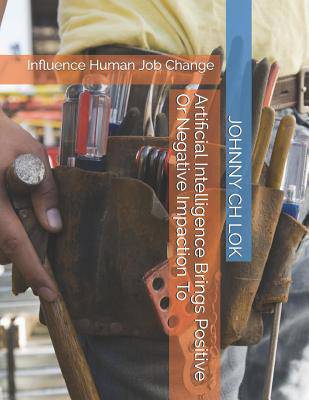
Wil je zeker zijn dat je cadeautjes op tijd onder de kerstboom liggen? Onze winkels ontvangen jou met open armen. Nu met extra openingsuren op zondag!
- Afhalen na 1 uur in een winkel met voorraad
- Gratis thuislevering in België vanaf € 30
- Ruim aanbod met 7 miljoen producten
Wil je zeker zijn dat je cadeautjes op tijd onder de kerstboom liggen? Onze winkels ontvangen jou met open armen. Nu met extra openingsuren op zondag!
- Afhalen na 1 uur in een winkel met voorraad
- Gratis thuislevering in België vanaf € 30
- Ruim aanbod met 7 miljoen producten
Zoeken
Artificial Intelligence Brings Positive Or Negative Impaction To
Influence Human Job Change
Johnny Ch Lok
€ 34,95
+ 69 punten
Omschrijving
Chapter Two Future works change: Automation, employment and productivity2.1How (AI) influences employment Human future " micro to macro" industry trends will be affected business strategy and public policy by (AI) technology. In the future (AI) technology will influence those six themes: productivity and growth, natural resources, labor markets, the evolution of global financial markets, the economic impact of technology and innovation and urbanization. However, (AI) technology will bring economic benefits of tackling gender inequality, a new global competition, Chinese innovation and digital globalization.Nowadays, advances in robotics artificial intelligence, and machine learning are in a new age of automation, as machines match or outperform human performance in a development to any countries. For example, automation of activities can enable businesses to improve performance by reducing errors and improving quality and speed, and in some cases achieving outcomes that go beyond human capabilities. For example, some research indicated automation could raise productivity growth globally by 0.8 to 1.4 % annually; more than 2,000 work activities across 800 occupations. When less than 5% of all occupations can be automated using demonstrated technologies about 60% of all occupations have at least 30% of constituent activities that could be automated. Many occupations will change that will be automated away: Activities most susceptible to automation involve physical activities, in highly structured and predictable environments, as well as the collection and processing of data. They are most prevalent in manufacturing, accommodation and food service and retail trade and include some middle-skill jobs. For example, such as natural language processing is a key factor. Beyond technical feasibility, the cost of technology competition with labor including skills and supply and demand dynamics, performance benefits including and beyond labor cost savings, and social and regulatory acceptance will be affected by (AI) automation technology. Thus, (AI) automation will impact to influence global employment in those aspects as below: Firstly, assuming that people are displaced by automation will find other employment. The anticipated shift in the activities in the labor force is of a similar order as the long-term shift away from agriculture and decreases in manufacturing share of employment. Both of manufacturing and agriculture industries which would be accompanied by the creation of new types of work not foreseen at the time.Secondly, for business, the performance benefits of automation are relatively clear. Thus, the businessmen have opportunities for their micro economies to benefits from the productivity growth potential and macro economies to benefit to encourage continued progress and innovation, investment and market incentives. At the same time, employers must innovate policies to help workers and institutions adapt to the impact on employment.
Specificaties
Betrokkenen
- Auteur(s):
- Uitgeverij:
Inhoud
- Aantal bladzijden:
- 122
- Taal:
- Engels
- Reeks:
Eigenschappen
- Productcode (EAN):
- 9781794467514
- Verschijningsdatum:
- 20/01/2019
- Uitvoering:
- Paperback
- Formaat:
- Trade paperback (VS)
- Afmetingen:
- 216 mm x 279 mm
- Gewicht:
- 299 g

Alleen bij Standaard Boekhandel
+ 69 punten op je klantenkaart van Standaard Boekhandel
Beoordelingen
We publiceren alleen reviews die voldoen aan de voorwaarden voor reviews. Bekijk onze voorwaarden voor reviews.











